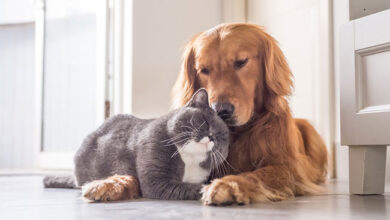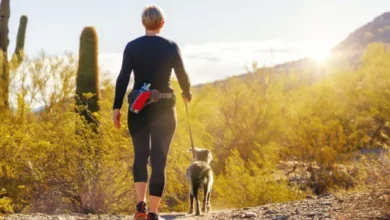
Many of us adore our precious fur babies as much as we would our natural children, but do they dream about us as much as we think about them?

You may be surprised to learn that studies show dogs aren’t as different from humans as we generally believed 30 years ago.
However, back then, if you’d have proposed dogs had feelings in the same way humans did, you’d likely be laughed out of town.
Read More:
While we’re certainly not the same, the mechanics of a dog’s mind are much more similar to humans than we once thought.
It turns out, dogs not only have emotions and feelings, but they dream too.
So, next time when you’re smiling down at the sight of your pup stirring at night, there may be more going on in that dreaming dog brain than you might think.
Do Dogs Dream?
Humans aren’t the only species that dream; many scientists believe that most animals dream regularly.
From giant elephants to tiny fruit flies, it’s generally understood that most mammals, birds, fishes, amphibians, and reptiles dream.
Similar to humans, dogs experience several sleep cycles, including REM (rapid eye movement) sleep, non-REM sleep, and periods of wakefulness.
We encounter dreams during the REM sleep stage when our eyes begin to move under our lids in a way similar to when we’re awake, and dogs are the same.
We experience vivid dreams in REM sleep, and this cycle is assumed to help us process new information and store memory.
Most of our brains include a function in our brain stems that disables movement as we dream, called the pons.
You may notice your puppy or older dog twitching during sleep because the pons is still underdeveloped in younger dogs and deteriorate in older dogs, hindering muscle paralyzation.
Without functioning pons, these pups are more likely to twitch during dreams than dogs in their prime— in fact, the same is true for humans.
Do Dogs Dream About Their Owners?
Dreams function as a way to form and organize memories, and dogs certainly have memories.
Most of us are familiar with how our sweet pups react when they see us; they wag their tails in excitement because they remember their people.
We experience chemical changes during emotional states, and it seems dogs do too.
According to Psychology Today, while canines are still animals, they have the same brain structure as humans, which contains the same hormones as well.
Given that dogs have many of the same neurological and chemical components, it’s reasonable to believe they have similar emotions; however, they probably don’t have the same emotional range.
Since dogs seem to have memories and emotions, it’s assumed they dream about things they experience in the real world, just as humans do.
Much of our dogs’ waking life involves their owners in some capacity, their worlds basically revolve around their masters, so they likely dream about us as well.
Dr. Deirdre Barrett, a Clinical and Evolutionary Psychologist at Harvard Medical School, explains, “since dogs are extremely attached to their human owners, it’s likely your dog is dreaming of your face, your smell and pleasing or annoying you.”
Aren’t dogs the best?
How Often Do Dogs Dream?
According to the American Kennel Club, the size of a dog may play a factor when it comes to how often our animals dream.
Small dogs like dachshunds and chihuahuas typically dream more— about one dream every ten minutes— than bigger dogs like golden retrievers or labradors.
Further, puppies and older dogs drift into dreamland more than middle-aged pups, which is because their brains are either still developing or, alternatively, deteriorating.
The reason puppies dream more than middle-aged hounds is because dreams are essential to help the brain process data and retain memories.
Since they’re so young, puppies are acquiring enormous amounts of information every day.
Research shared by the Veterinary Centers of America, Inc. indicates that dreams could be related to the amount of sleep needed by each dog.
Large dogs that have endured an exciting and active day at the park, or the beach, for example, will likely sleep longer and more soundly than they would after a typical day— and encounter longer phases of REM sleep, allowing more time to dream.
Do Dogs Have Nightmares?
Dogs can have dreams, and they can have nightmares too. Similar to how you shouldn’t wake a sleepwalking human due to potential harm, you shouldn’t wake a dog having a nightmare.
You might occasionally notice your dog snarling, crying, or even growling during sleep, and while it looks like they’re scared in these cases, it’s wise to retrain yourself from waking them up.
Dogs suddenly awakened out of a frightening dream could become confused as to where they are or who they’re with and may lash out impulsively; as a result, this could cause harm to you or others.
Animals cannot create imaginative monsters, so when they have scary dreams, they’re likely replaying a negative or traumatic experience.
If your pup has nightmares frequently, you could potentially help mitigate these by creating a more relaxing or safe sleeping environment.
Some dogs enjoy having their own “den,” as it makes them feel safe and secure. Canines instinctively look for small, cave-like spaces to retreat to protective shelter, so crates will often serve this purpose.
According to the American Kennel Club, most veterinarians, breeders, and trainers recommend owners provide crates and train dogs from a young age to use them as a safe space.
When your pup is worn out from a chaotic day, scary incident, or a busy household, they can retreat to their crate to self-soothe, deal with anxiety, or recharge.
Crates can also help dogs successfully manage a new addition to the house like a newborn baby, making everyone’s lives easier.
Dogs are often enormous sources of joy and happiness for their owners, so finding yourself wondering how their mind works is normal.
Our children are precious to us, including our fur babies; we want to protect them and give them the best lives possible, and we hope your dog will enjoy heart-warming dreams for years to come.



